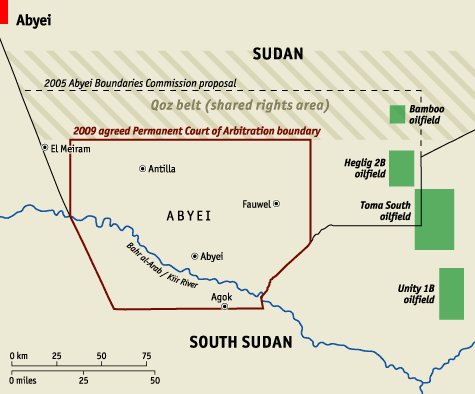You are here: Home | Humanitarian | News | Politics | Abyei natives differ on fate of troubled region

Map of the contested Abyei Administrative Area.
An official said members of the Abyei community are divided over a suggestion to the governments of Sudan and South Sudan to establish an autonomous government in the region.
The proposal by Abyei prominent politician Dr. Francis Deng Mading, called for a self-governing Abyei that could still be linked to both countries, with security guarantees from the international community.
Dr. Francis Deng Mading making Abyei independent from Juba and Khartoum could serve as an ultimate goal to achieve lasting peace, security, and stability in the region.
It will also help bring services and development opportunities closure to women and youth, he said.
Mading also said the proposed Abyei independence will promote their participation in public life, and bring peaceful coexistence between the Ngok Dinka and neighboring communities.
Although the proposal gained popularity among the natives, not all welcomed it.
The Chief Administrator of Abyei, some civil society embers, and traditional leaders reportedly rejected the idea.
Speaking to Eye Radio on Thursday morning, Romano Kuat, the Chairman of the Secretariat of the National Committee for the Final Solution of Abyei says the proposal has put a rift among the community.
“Frankly speaking the proposal divided the Abyei community into two, some accepted the proposal, some rejected the proposal,” he said.
“Those who accepted the proposal thought it will be relative peace, it would bring security and some services to the area. Those who rejected it say now people suffered a long time, this time we don’t want interim arrangement because this issue of interim arrangement was tried several times.”
The oil-rich border region of Abyei has been contested since South Sudan gained independence in 2011.
It was accorded special administrative status by a 2004 Protocol on Resolution of the Abyei Conflict, known as, the Abyei Protocol.
A referendum was supposed to be held in 2011, in which the residents of Abyei could decide either to remain part of Sudan or to become part of South Sudan.
However, it was postponed indefinitely due to disagreements over the process.
As a result, the Dinka Ngok and the Mesiriya tribesmen of Sudan unilaterally conducted separate referendums – that were not recognized by either government.
In 2020, a UN official told a Security Council meeting that, despite improving relations between Sudan and South Sudan, progress was unlikely in a short term in determining the final status of the Abyei Area.
In May last year, President Salva Kiir constituted a high-level committee to initiate dialogue with the Sudanese government on the final status of the Abyei Administrative Area.
The committee members who were expected to feed President Salva Kiir with monthly updates on the progress of the negotiation have so far made no progress.
Yesterday President Salva Kiir told the Chair of the Abyei File, Deng Alor he would soon make his final position on the final status of the Abyei
His remarks came amid mixed reactions among Abyei intellectuals and community organizations toward Mading’s proposal.
The Office of the First Vice President also issued a statement rejecting the proposal of granting Abyei autonomy, saying the views of the people of Abyei must be respected.
Support Eye Radio, the first independent radio broadcaster of news, information & entertainment in South Sudan.
Make a monthly or a one off contribution.
Copyright 2024. All rights reserved. Eye Radio is a product of Eye Media Limited.